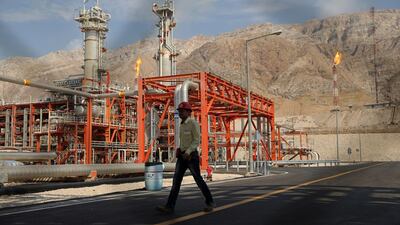China National Petroleum Corporation’s role as a possible lead operator in a $4.8 billion Iran gas project is “uncertain” following the exit of co-investor French oil major Total due to US sanctions against Tehran.
“The South Pars phase 11 contract has a clause giving CNPC the option to replace the French major as the operator in the case sanctions are re-imposed, but this clause is not constraining,” said Homayoun Falakshahi, Middle East upstream analyst with Wood Mackenzie.
“While we understand the phase 11 contract offers relatively good terms, potentially generating an internal rate of return above 17 per cent, it is not certain if CNPC is willing to assume the project’s operatorship."
CNPC couldn't be reached for comment.
Chinese firms’ previous involvement in Iran, which has the second-largest gas reserves after Russia and 9.3 per cent of the world's proven oil reserves, has been fractious. CNPC's license to develop the large South Azadegan field near the Iraqi border was revoked in 2014 due to delays. The project to develop phase 11 of South Pars, which counts CNPC, Total and the local Petropars as partners, was considered a big win for the Iranian gas sector, which has languished from lack of investment and technology.
Total, which has significant gas expertise, was expected to bring its technical capabilities to develop the project alongside its partners, who now may not be able to develop the scheme on their own.
"Total’s exit is a big blow for Iran. The main challenge posed to Iran is that it had bet high on Total’s technology not only for phase 11, but for the future of the whole South Pars field,” said Mr Falakshahi.
The development of phase 11 was divided into two stages, the first involved a simpler process for pumping gas but the second phase requires more complicated technology.
__________
Read more:
Total confirms exit from $4.8bn gas project in Iran before US deadline
Total says CNPC has right to replace its lead on Iran project
Exclusive: Total to apply for waiver if US withdraws from Iran deal
__________
The Chinese firm may likely backtrack on potential involvement if it considers the second stage to be “too risky”, leaving Iran with the option of involving Petropars to execute stage one and new partners to tackle the last phase. Another option would be for state-owned National Iranian Oil Company to involve a consortium of local companies to develop the project. However, access to finance would be a challenge. Iran could also possibly cancel the project if it is unable to find financiers and expertise to develop a scheme it considers crucial to revive its gas industry.
Iman Nasseri, managing director for the Middle East at Facts Global Energy, is also doubtful of CNPC’s continued commitment to the project, noting the company had “strong incentive” to leave.
“The US-China trade war has created a lot of uncertainty over China’s situation with regards to Iran and the US sanctions on Iran’s oil industry,” he said.
Total, which has spent around $55 million in administration costs, front end engineering and design as well as launching tenders on the project, would be unable to recover its money following its exit, said Mr Falakshahi. Its payments would have had to come from revenues generated from the scheme, he added.
However, in the event of a CNPC takeover, the two companies may come to terms to agree to a partial or total recovery of costs. Should CNPC also exit the project, Total will not be able to make any recovery on its investment so far.
Tenders issued on the project will continue as usual but subject to review by the joint venture company, said Mr Nasseri. Mr Falakshahi noted that CNPC may lobby to get its affiliates involved in contracting work.


